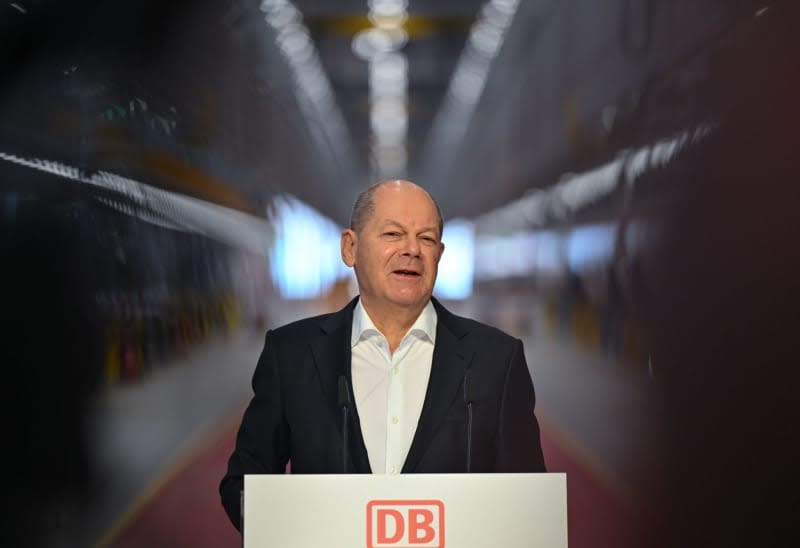Scholz blasts far-right plan to repatriate Germany's immigrants

- Oops!Something went wrong.Please try again later.
- Oops!Something went wrong.Please try again later.
German Chancellor Olaf Scholz has harshly denounced plans by far-right extremists for the repatriation of immigrants, saying no one deserves to be judged on where they come from or the colour of their skin.
"Learning from history is not just lip service. Democrats must stand together," the chancellor wrote on X, formerly Twitter, on Thursday, alluding to Nazi Germany's genocidal pursuit of racial purity in the Holocaust.
"We will not allow anyone to differentiate the 'we' in our country based on whether someone has a history of immigration or not," Scholz continued.
"We protect everyone - regardless of origin, skin colour or how uncomfortable someone is for fanatics with assimilation fantasies."
Scholz's remarks came in response to a report by the investigative outlet Correctiv, which detailed a recent meeting between members of the Alternative for Germany (AfD) party and a far-right group advocating for immigrant repatriation.
The report has caused an uproar in Germany, where there is mounting dread among mainstream political parties about the surge in public support for the AfD. The party is riding high in the polls of three former East German states that hold regional elections later this year.
According to Correctiv, AfD politicians took part in a meeting in Potsdam, outside of Berlin, in November during which Martin Sellner, the Austrian activist and the driving force behind the Identitarian movement - a far-right political group with an extremist background - presented his ideas about the repatriation of potentially millions of people with immigrant backgrounds.
He reportedly presented ideas on how foreigners could be pressured to leave Germany and how people with an immigrant background could be forced to assimilate, among other measures that have alarmed Germany's political establishment.
Sellner confirmed to dpa that he presented ideas for what he described as "remigration."
Roland Hartwig, an adviser to the AfD co-leader Alice Weidel, was among the party members present.
The AfD is already under surveillance by Germany's domestic intelligence agency, the Office for the Protection of the Constitution.
The president of the agency told public broadcaster ARD on Thursday that many Germans do not take threats to democracy seriously enough. Democracy in Germany is under greater threat than is perceived by the centre of society, Thomas Haldenwang said. This can be seen in the indifference "towards the rise of certain parties," but also in the way anti-Semitism is dealt with, Haldenwang said.
Christian Dürr, the chair of the the liberal Free Democrats' parliamentary group, saw parallels to Germany's Nazi past.
"The plans to expel millions of people are reminiscent of the darkest chapter in German history," he wrote on X.
The report by Correctiv "shows that the AfD deeply denies democracy and our liberal basic order."
Kevin Kühnert, the general secretary of Scholz's centre-left Social Democrats, said all Germans must take a stand against the AfD.
"I appeal to all those who do not want history to repeat itself: Show your colours and do not leave the field to those hostile to humanity," Kühnert told the Funke media group of newspapers.
A new public opinion poll released on Thursday showed the once-fringe AfD party flourishing, with national support for the populists hitting 24% in the latest YouGuv survey.
The anti-immigration and eurosceptic AfD has consistently achieved more than 20% in YouGov's polls in recent months.
Other institutes - such as Forschungsgruppe Wahlen and Infratest dimap - have lately placed the party at around 23% support.
That makes the AfD Germany's second-strongest party, according to the polls, which typically ask Germans to reveal their choice if elections were held this weekend.
The centre-right opposition bloc of the Christian Democratic Union (CDU) and the regional Bavarian Christian Social Union (CSU) has seen support hover around 29%.
In the YouGov survey, only 15% named Scholz's SPD as their choice, followed by the Greens at 12% and the FDP at 6%. The three parties make up the governing coalition in Berlin.
The next German federal election is not due until 2025.
However, there be elections in Germany's eastern states of Thuringia, Saxony and Brandenburg in September. At the moment, the AfD appears to be in a strong position to win the states.

